
Intern Fellows
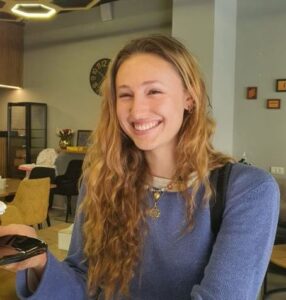
Name: Haneen Khano
University Course: BA in International Development and Arabic, University of Sussex
What started your interest in the region? I am of Palestinian heritage and the paternal side of my family still live in Palestine. I grew up in Jerusalem and then in Jordan so the region never ‘became of interest’ to me. It was just the reality of my life. As a child I remember understanding that being Palestinian was different. People reacted differently to the identity of ‘Palestinian’ as opposed to ‘Italian’ or ‘Brazilian’. For a long time I didn’t want to understand that difference because I knew it came with pain and responsibility. With age I began to take more interest in the Palestinian struggle and the role that the international community played and continues to play in sustaining the conflict. This created a passion in me to fight the lies and misrepresentation spread about Palestinians and Arabs and try and educate whoever would listen about the beauty and warmth of the whole Levant region.
Why did you apply for the fellowship? My interest in the Balfour project is first and foremost motivated by my desire to fight for a just existence for the Palestinian people. Global governments have continuously failed Palestine and I feel the public and NGOs have an important role in advocating for equal rights and justice for all in the region. The work of the Balfour Project is an important part of this fight. This project brings together young people with affiliations to Israel and Palestine as well as people with no connection to the region, to share their experiences, knowledge, and ideas. It is this type of collaboration and communication between international actors that are Palestine’s last hope in making even a small step towards justice.

Name: Jasmine Moore
University Course/Current occupation: BA History and Politics at Durham (2020-2023); Research Intern at Ben-Gurion University (Sept-Nov 2023); Parliamentary Caseworker (Nov 2023-)
What started your interest in the region? When carrying out research for my undergraduate dissertation, I found that there was a well-rehearsed and oft-told narrative of East Jerusalem; one defined by antagonism and domination, and rarely mentioning the human agent. It was by researching micro-histories, looking at the daily struggles Palestinians endured in the city, that I hoped to humanise East Jerusalemite Palestinians. It was this narrative that I felt passionately was not represented in mainstream academic approaches nor by the mass media. Since then, I have undertaken a research placement at Ben-Gurion University in Israel looking further into themes of Palestinian resistance and resilience in Jerusalem.
Why did you apply for the fellowship? I often feel that it is difficult to engage with global issues in ways that feel meaningful. To contribute to peace-building efforts and see tangible results can often feel impossible as a singular entity (despite the passion and drive one may have). Yet, I believe the fellowship’s capacity as a forum for discussion and its knowledge and skill-based training programme offers an important foundation for those determined to make a meaningful contribution to any lasting peace process.
Being in Israel during the escalation of violence in October has cemented for me the importance of this fellowship. Living in the Arab Bedouin town of Rahat, I saw first-hand how the war has only exacerbated Palestinian marginalisation and has created a situation of crisis in the Negev.

Name: Kira Nygren
Course: BA Geography & Politics, Durham University (2020 – 23)
What started your interest in the region? While my Palestinian heritage wasn’t often discussed at home, my curiosity around this contentious space grew during my A-Levels, especially as I watched the Gaza border protests of 2018/19. It was then that I started questioning how British media portrayed Palestinians, particularly noting the absence of a humanistic approach and meaningful dialogue concerning the profoundly intimate impact on Palestinians, Israelis and the diasporic community. This gap in reporting motivated me to undertake an extended project in my last year of school which focused on graffiti in the Palestinian Territories. By demystifying the conflict and drawing tangible connections to other global crises, I aimed to encourage fresh perspectives on Israel-Palestine.
Why did you apply for the Fellowship? I chose to apply to the Balfour Project in the hope of engaging with work that would make clear the UK, as a liberal democracy, has a moral responsibility to advocate for justice in Israel-Palestine, just as it does in other nations. I am convinced that the UK has an opportunity to reshape its narrative and play a meaningful role in promoting equal rights in Israel-Palestine.
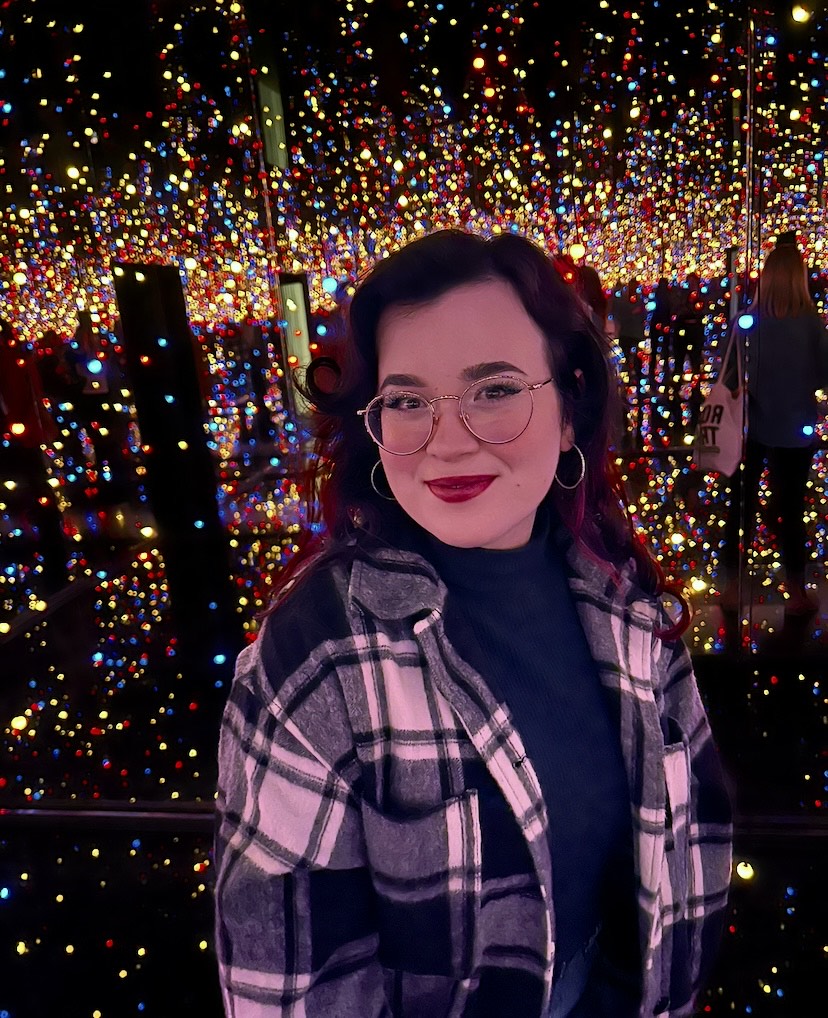
Name: Lara Arekat
University Course: MSc Politics of the Middle East, SOAS.
What started your interest in the region? Growing up half Palestinian, I’ve always felt connected to the region, and been interested in its complex and nuanced politics. Hearing of my grandfather’s plight in the Six Day War inspired my passion for studying a BSc in International Politics, and also having Irish patronage further contributed to my interest in colonial resistance. My recently completed MSc in Politics of the Middle East allowed me to deeply study the topics I am passionate about, particularly how much Middle Eastern history can be attributed to the ever-present grasp of Western power.
Why did you apply for the fellowship? I have always been a huge advocate for the power of the people and the transformative potential of collective action, having experience in local and youth-led politics. I applied for the fellowship because I care about raising awareness of Britain’s responsibility to equal rights and justice in Israel and Palestine because, without awareness, there can be no informed dialogue. Resolution is not instantaneous, and requires passionate individuals determined for ground-up change. It is also a deeply personal issue to me, which has further motivated me to strive toward meaningful progress.
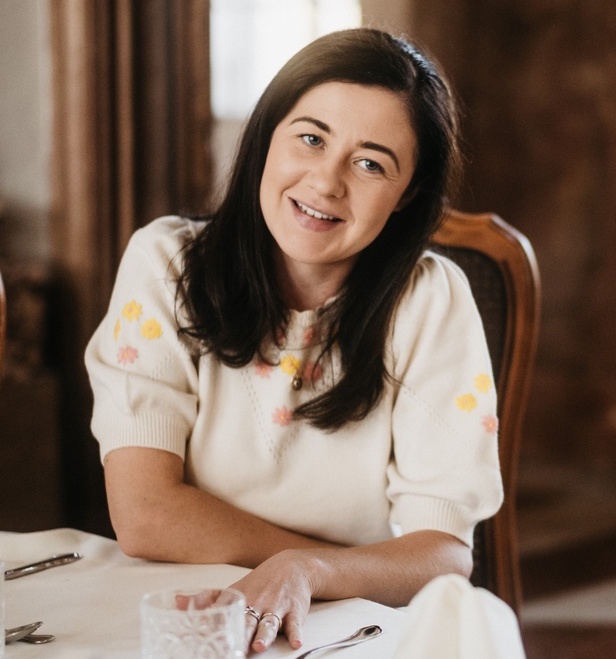
Name: Dr Rachael Stockdale
Current occupation: Postdoctoral Researcher at University College Cork
What started your interest in the region? Coming from the north of Ireland, a post-conflict region, I am passionate about peace building and international efforts of solidarity.
Why did you apply for the fellowship? I have previously worked directly with Israeli and Palestinian young people with the Youth Peace Initiative, a youth led organisation that promotes the inclusion of youth in peace and reconciliation processes and I hope to continue this work with The Balfour Project.

Name: Taya Amit
Current occupation: Special Educational Needs and Disabilities Tutor and recent graduate in BA International Development from University of Sussex
What started your interest in the region? Being born in Israel proper, raised in the UK and attending Orthodox Jewish schools, I was never taught to question the history of Israel. Going to university, I was able to learn about this region in context of its settler colonial state, apartheid, and genocide it has enforced against Palestinians. Being able to talk about Israel and Palestine outside of a Jewish bubble has granted me the space to deeply critique and analyse what a “Jewish Homeland” really means, and at what cost.
Why did you apply for the fellowship? The Balfour Peace Project provides a strong balance between creative autonomy and assistance during our projects. Being able to collaborate with like-minded activists, all bringing their own experience, is an invaluable space to be in.
 Name: Valentin Herdeg
Name: Valentin HerdegUniversity course: BA International Relations at SOAS, currently enrolled at the Palestine and Arabic Studies Program at Birzeit University.
What started your interest in the region? Growing up in Germany I was exposed to a collective narrative that saw the support for Israel as a fundamental means to overcome Germany’s historic guilt. Palestine and Palestinians had no space in this story, unless Germany could help police them in its effort to protect the Israeli state. After graduating from high school, I decided to travel to the region to make sense of it through my own eyes, and the eyes of Palestinians and Israelis. My trip influenced my decision to study International Relations at SOAS University of London and enter an academic and political space in which I could openly learn about Palestine/Israel and ‘Middle Eastern’ politics more broadly.
Why did you apply for the fellowship? I believe that raising awareness about Britain’s (continued) responsibility in the oppression of the Palestinian people constitutes a crucial tool to change the violent status quo. For the British public to stand up for Palestine, it needs to feel personally connected to it. This is where I see the potential of the Balfour Project: enabling people to understand that the history of Israel and Palestine is also their history; and that working towards a future of peace and justice for Israel/Palestine is also their responsibility.
Associate Fellows
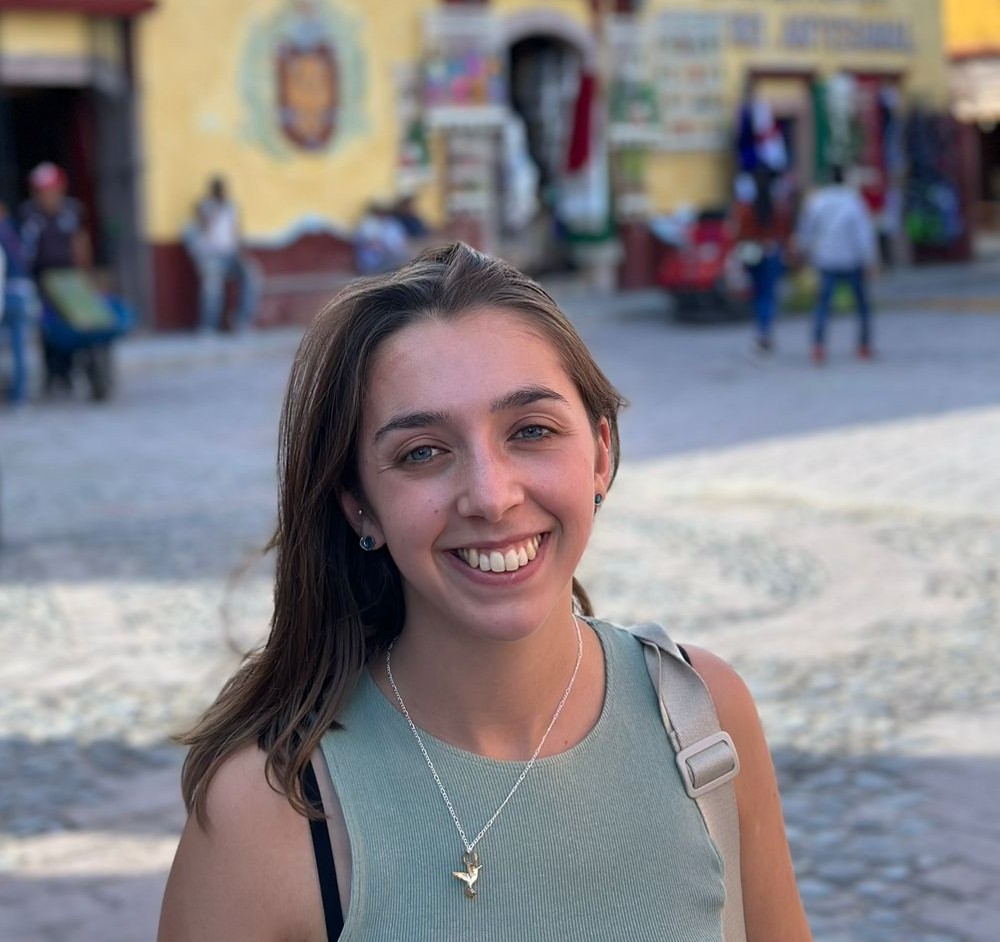
Name: Abigail Towle
Course: MSc Education Policy and International Development, University of Bristol
What started your interest in the region? I grew up in a British Jewish community and have always been interested in Israel and Palestine. When I first started university, I was exposed to more complex questions and conversations about the politics of the region and about Britain’s geopolitical responsibilities. A few years ago, I became a member of Liberal Jews for Peace in Israel and Palestine (LJPIP), a grass-roots organisation which aims to raise awareness of issues in Israel and Palestine and encourage critical discussion amongst Liberal and Progressive Jewish communities in the UK. I have also volunteered and worked in the non-profit sector for over 5 years, which has further developed my interest in social justice and equity.
My interest in Israel and Palestine has increased through studying international development and education. I have researched human rights and critical peace education in Palestine’s West Bank and learnt more about Britain’s role in the conflict. I also visited Israel in August 2023 and was able to speak with Palestinians and both Jewish and Arab Israelis, which helped me gain a more nuanced understanding of Israeli-Palestinian relations and gave me a personal perspective on the impact of the conflict.
Why did you apply for the fellowship? My most recent trip to Israel inspired me to take an active role in peace advocacy work outside of the Jewish community. I thought the fellowship would be complementary to my academic studies and research interests and would be a great opportunity to enact change in the UK. While learning about Israel and Palestine, my experience has been that there are grossly polarised views, where discussions seldom acknowledge Britain’s role in the region. For this reason, I thought that the Balfour Project’s focus on Britain’s colonial accountability was particularly interesting; I have studied decolonisation in depth, and I am looking forward to learning more about and raising awareness of Britain’s colonial past in Palestine on the fellowship programme.

Name: Adrian Kreutz
Current occupation: Lecturer Political Theory, University of Amsterdam; PhD Politics, New College, Oxford
What started your interest in the region? My interest in Israel and Palestine stems from personal connections to the region. I was previously involved with the the United Nations, Department of Political and Peacebuilding Affairs, Division of Palestinian Rights on a project researching the origins of the partition plan. Most recently, I joined Al-Haq in Ramallah on their International Human Rights Law programme. Beyond that, I am academically interested in the political and legal situation in Israel and Palestine. My doctoral research addresses questions of legitimacy and political self-determination, touching on topics of legal subalternity and postcoloniality, for which of course the State of Israel, calls for Palestinian self-determination, and the occupation are tangible examples.
Why did you apply for the Fellowship? I applied for the fellowship because I believe that the UK’s historic role and current relationship with Israel and Palestine is misunderstood. Yet, I do think that British civil society and politics could have a major impact on the formation of narratives around Israel and Palestine in the international community. I believe that the UK is in a unique position, if it wanted to, to shape and determine the situation in the Middle East for the better. Furthermore, I was intrigued be the amazing opportunities for advocacy training, which I am hoping to make use of in my future career.
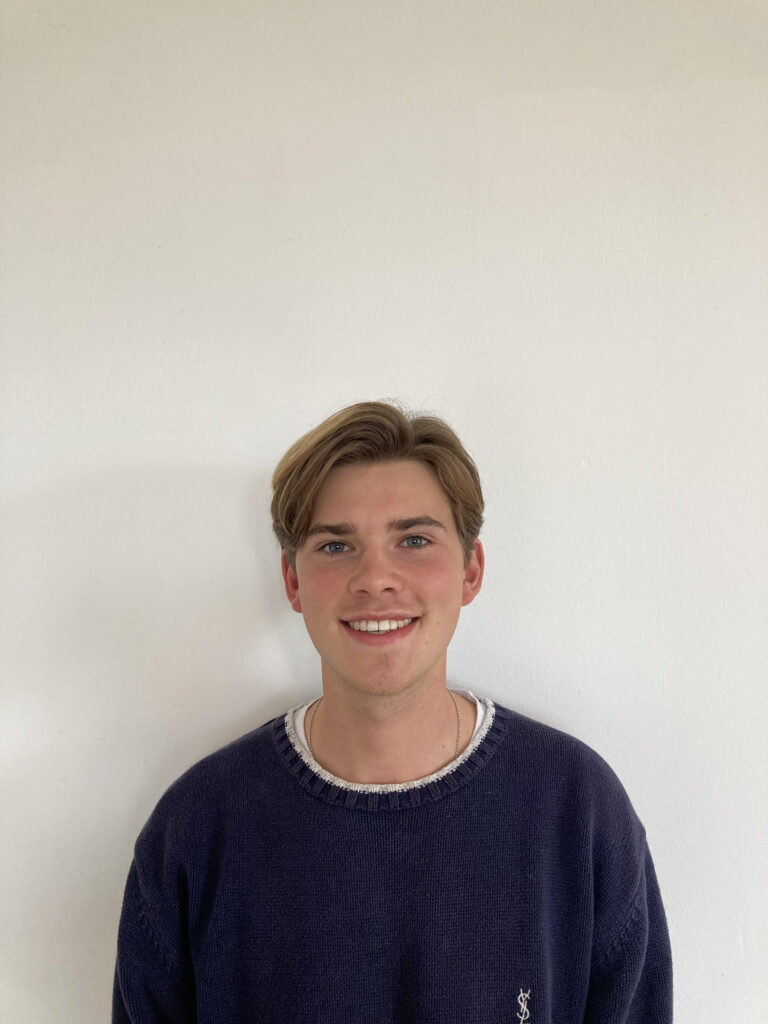
Name: Alex Fairhead
University Course: Graduate Diploma in Law, City Law School
What started your interest in the region? My interest in the region was originally sparked by education. I studied the conflict both at school and at Sciences Po, where I took two courses on the subject: one focusing on the UN and another in the context of Britain’s colonial legacy.
Why did you apply for the fellowship? For me, being a part of the Balfour Project means standing up for the rule of law, recognising Britain’s colonial legacy and being a part of solution to a devastating conflict. I passionately believe in the work they do and their intention to be part of the peace process.
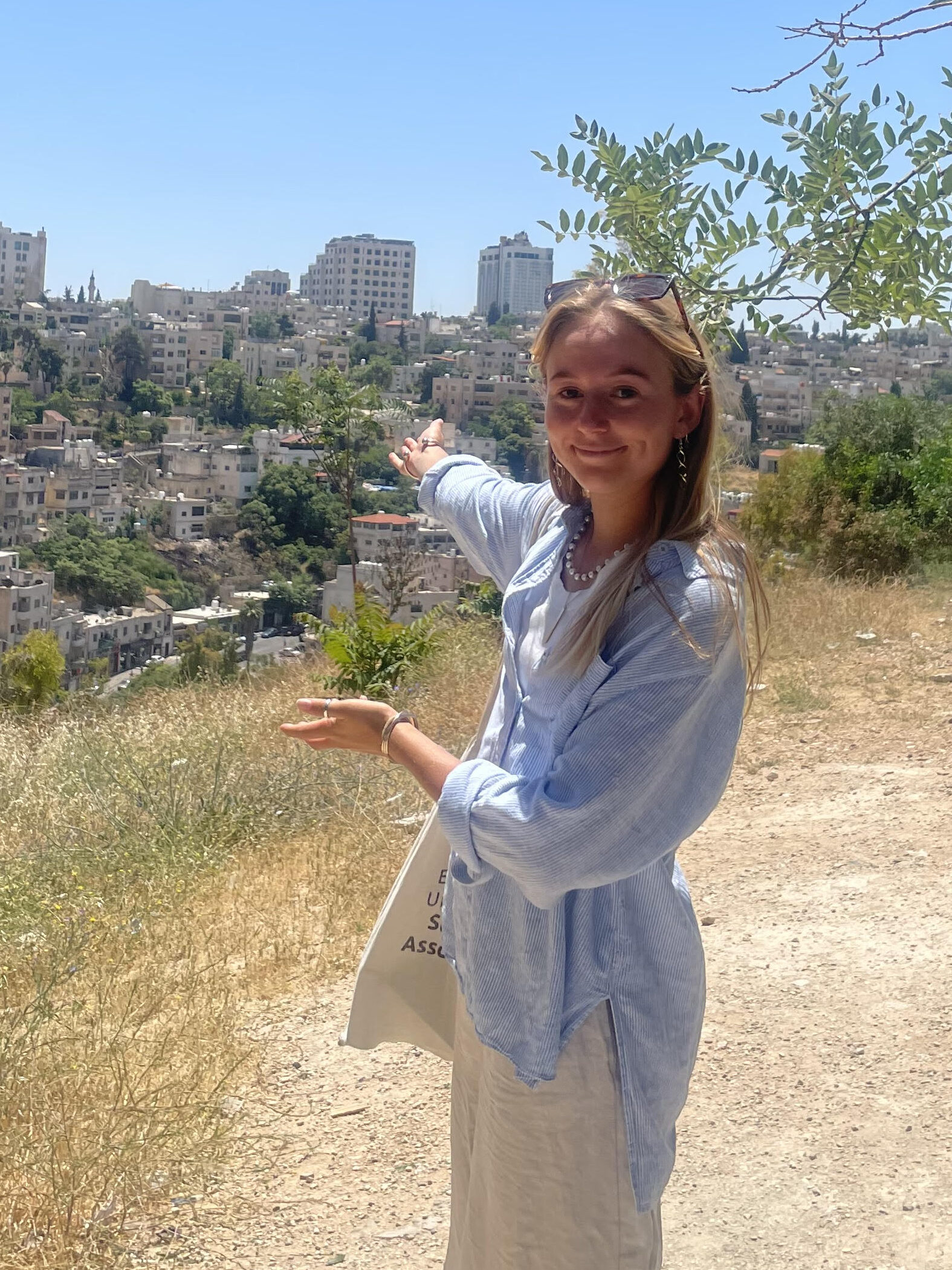
Name: Becky Beard
University Course: Ma Hons Arabic & French, University of Edinburgh
What started your interest in the region? While studying Arabic, I spent an incredible year living in Amman, Jordan. Many of my teachers and friends there were Palestinian, or had links to Palestine. The more I learned from their stories and discussions with them, the more I spent time engaging with sources and literature around the history of the region with the intent of really starting to understand the effects that the conflict had on people, specifically exploring the issues faced by women in both Israel and Palestine as emblems for nationalism.
Why did you apply for the fellowship? The more that I learned along my journey, the more I really understood the extent of Britain’s involvement in the origins of the conflict. The Balfour Project not only addresses British colonial involvement upfront, but offers a chance to learn from and collaborate with others to develop skills of advocacy and peace building. Being afforded the opportunity to work towards educating others about what we can do to promote human rights and peace efforts, both in and beyond the region, is more important now than ever.
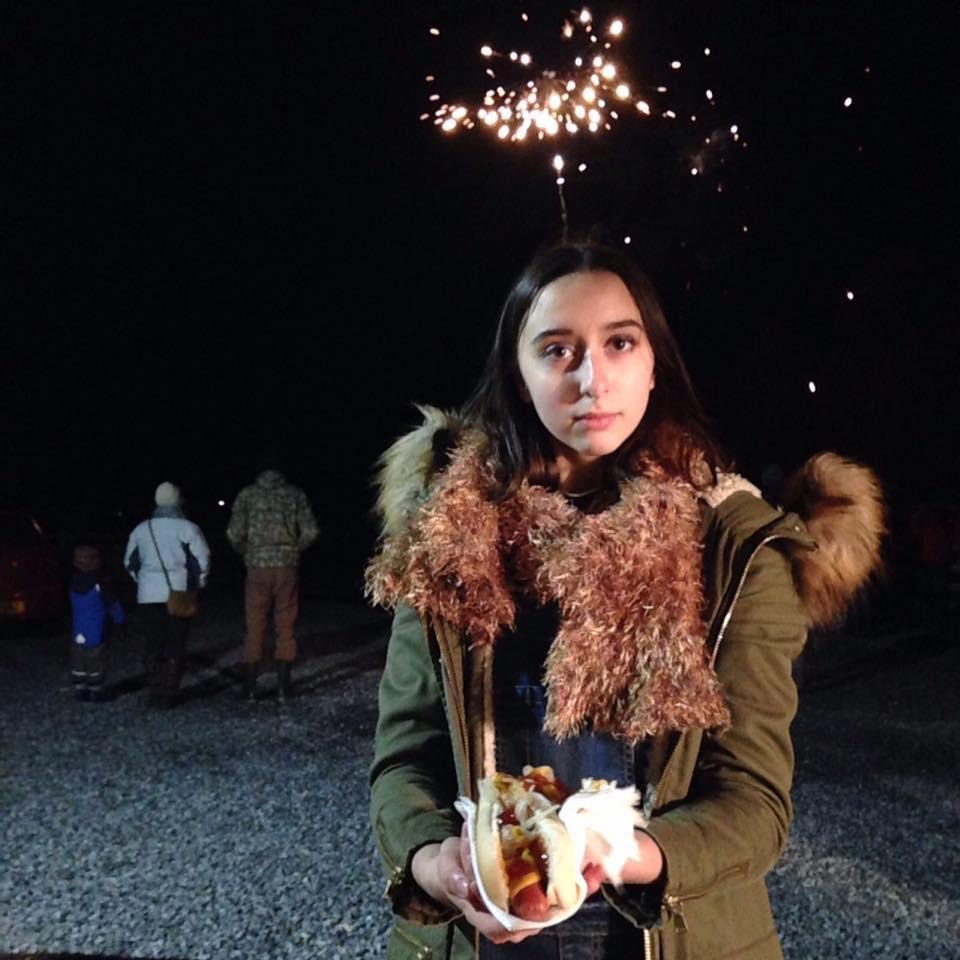
Name: Elah Cohen
Course: Arabic and International Relations (MA) Hons, St Andrews
What started your interest in the region? As I spent my early years in Israel and I am half Israeli, I feel I was always interested in the region at a personal level. Growing up I enjoyed listening to Mizrahi music and Arab pop. I chose Arabic at university as I was interested in learning the language my Lebanese grandfather spoke, and his culture. Arabic ended up being the favourite aspect of my degree and enabled a further cultural appreciation of the region. I have just returned from Amman, Jordan, where I studied Arabic. Prior to this I worked in a Palestinian-owned hostel in Haifa which enabled a unique understanding of the various identities and beliefs wrapped up in this region.
Why did you apply for the fellowship? I was exposed to differing narratives growing up and found it difficult to form a personal cohesive understanding. The conflict was often presented as territorial within mainstream British society, yet this was a very different narrative to what I read in Palestinian perspectives. I would like the opportunity to understand ways to bridge this gap better
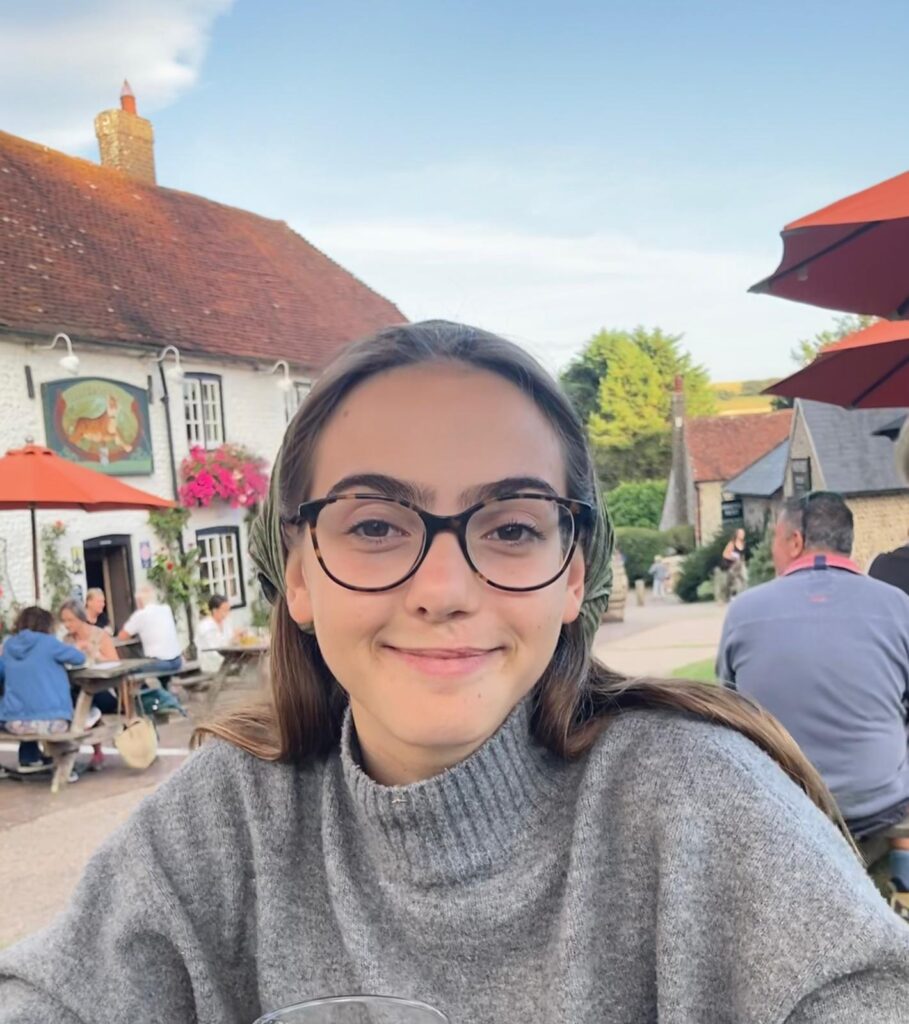
Name: Emma Todres
University Course: MA Migration and Diaspora Studies with Intensive Arabic at SOAS.
What started your interest in the region? My interest in the region started in my teenage years, when I was assigned Israel at my school’s MUN. Since then, I have been engaged in learning about the historical origins of the conflict and understanding how these dynamics and events contributed to creating the current situation of apartheid and occupation. Spending time in the West Bank further cemented my belief that more international awareness must be raised about the Occupation and efforts to end it.
Why did you apply for the Fellowship? I applied for the fellowship because of my belief that Britain must be held accountable for the role it has played in creating the situation we see today – a topic which is largely not discussed in the UK. The Balfour Project’s mission of raising awareness of this history amongst the British public and government therefore strongly aligned with my own views about the necessity of spreading this knowledge in the UK.
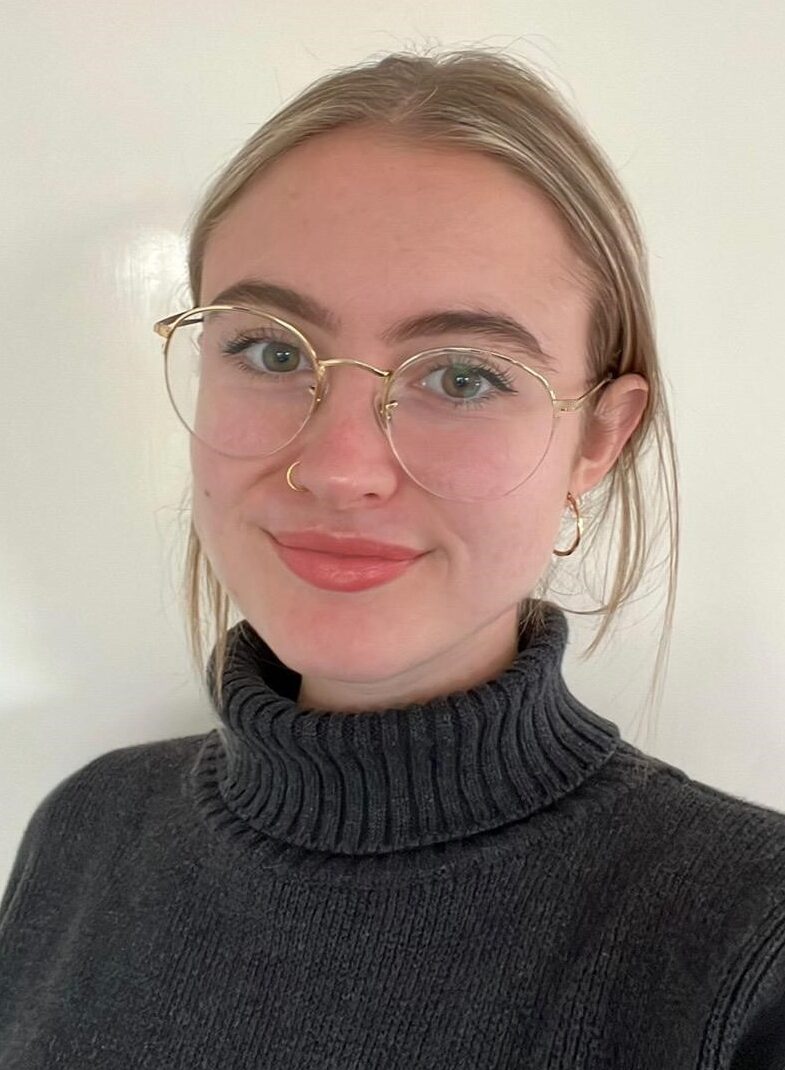
Name: Lily Wood
University Course: MA International Law at SOAS
What started your interest in the region? My interest in the Middle East started with Israel and Palestine, when for my History A-Level studies I chose to look at the 1948 War. I was fascinated by the particularly polarising and emotive nature of the Arab-Israeli conflict, as well as the historic role of my own country, the UK. This sparked an interest in the Middle East more broadly, which led me to my undergraduate degree in Arabic and developed my understanding of the region. It seems to me that every facet of and debate within international law is present in the history of Israel and Palestine, and it is my interest in this subject that led me to pursue my current postgraduate legal studies.
Why did you apply for the fellowship? Despite the complexity of the region’s history, the Balfour Declaration remains at the heart of the Israel-Palestine issue, yet Britain’s role often goes largely unacknowledged in discussions about responsibility for conflict resolution. I am keen to apply my academic studies of the region along with my language skills to make a tangible contribution to the work being done by the Balfour Project, whose vision strongly resonates with my own values and interests.
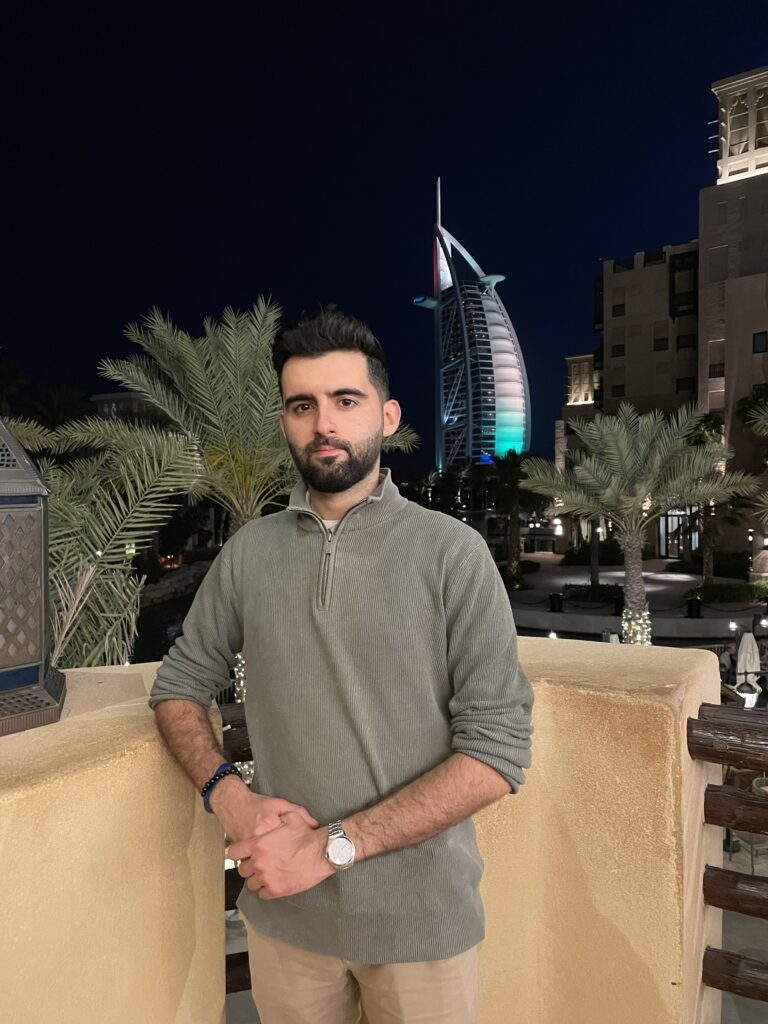
Name: Matine Khosrowshahi
University Course: MA in Violence, Terrorism and Security at Queen’s University Belfast.
What started your interest in the region? As someone who is of mixed Anglo Persian heritage, history and politics were always taken seriously by my family and from a young age, I have been exposed to and taken an interest in political discourse, specifically when it came to the Middle East.
Growing up, living and studying in the United Arab Emirates for 14 years, as well as travelling extensively in the Middle East, fueled my interest in the Israeli Palestinian conflict, especially as I had the opportunity to engage with a variety of Arab nationalities, as well as members of the Palestinian diaspora, learn about their history and experience living amongst them. My interest in the region continues to the present day, having graduated with a BA in Middle Eastern Studies from Manchester University in 2022, and currently completing my MA with a focus on some of the issues driving the political violence in the region.
Why did you apply for the fellowship? Participation in the Balfour Project is important to me because it will allow me to work alongside like minded people who are genuinely interested in bringing a measure of peace and justice to the Israeli-Palestinian conflict, through a practical and nonpartisan approach. I’m also looking forward to learning new perspectives and approaches from fellow members, as well as the trustees who have decades of experience in diplomacy and academia in the region, and specifically on the conflict itself. Finally, I think it is only right that pressure should be put on the British government to take responsibility for, and rectify to the extent possible, the injustices that are the direct consequence of the Balfour Declaration of 1917.
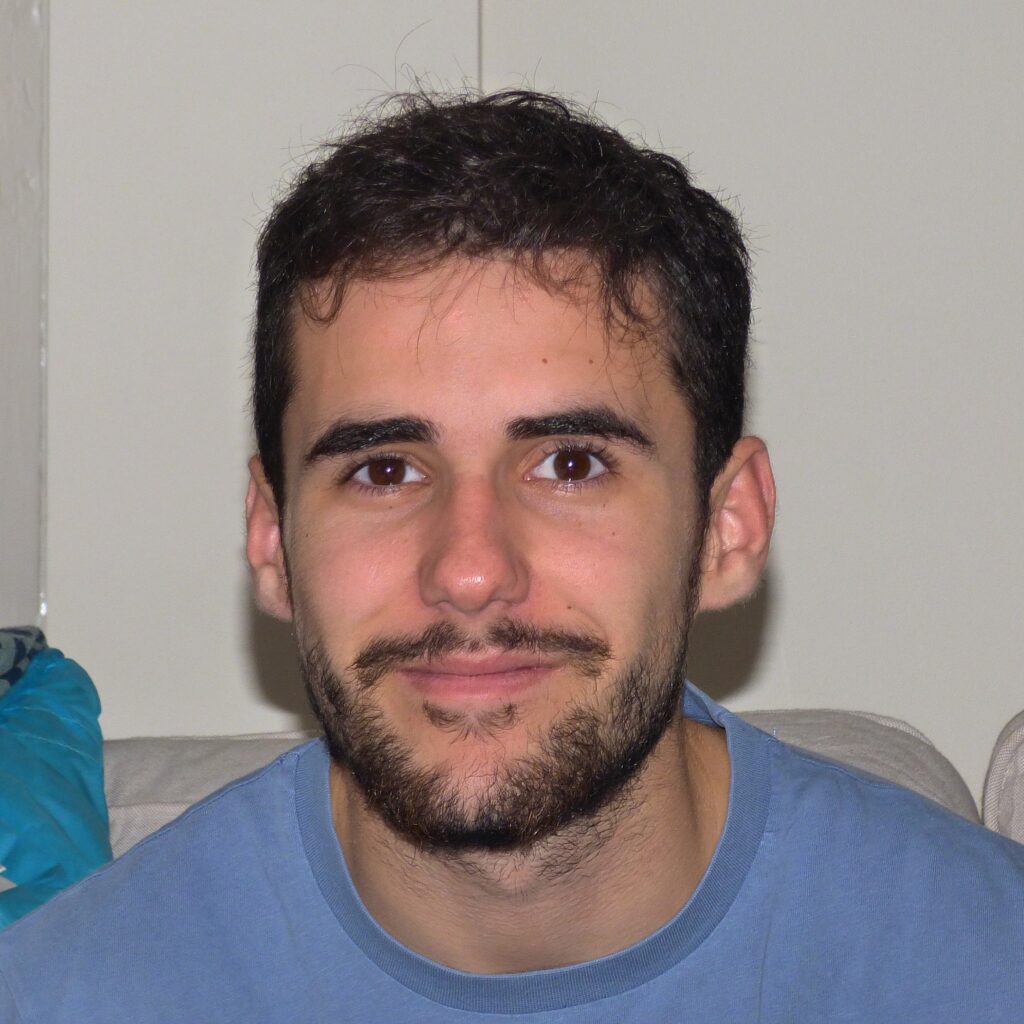
Name: Matthew Cockrell
University Course: Recent graduate in MSc Violence, Conflict and Development from SOAS
What started your interest in the region? My journey towards joining this fellowship project striving for peace in Israel/Palestine is deeply rooted in a commitment to justice and a profound personal experience. At the age of 14, I embarked on a school trip to Palestine, an eye-opening encounter that would shape the course of my life. It was during this trip that I bore witness to the stark realities of the separation walls and the profound injustices stemming from Israel’s occupation. The images of that journey remain etched in my memory and kindled a fire within me to dedicate myself to working towards a just and lasting peace in the region.
Why did you apply for the Fellowship? My academic background has equipped me with a solid foundation for addressing the complex issues in this region. I am dedicated to supporting this fellowship project in its mission to bring about peace by recognizing the rights and aspirations of both Palestinians and Israelis. This mission has gained even greater significance in light of the ongoing Israel-Gaza conflict.
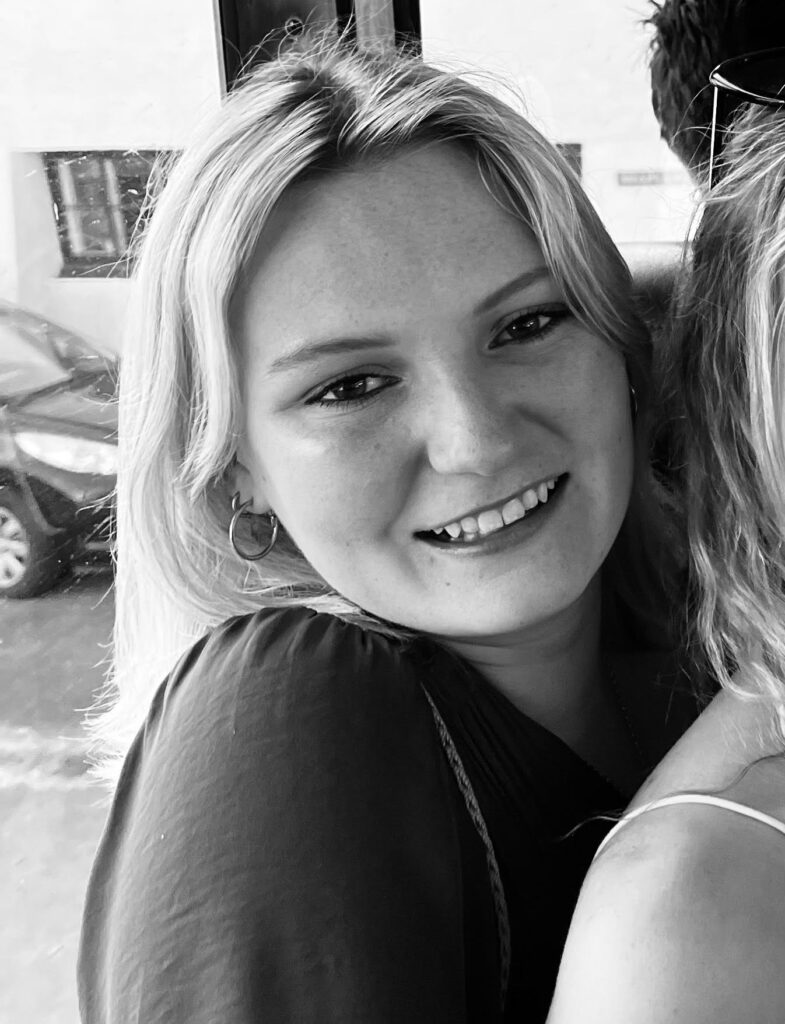
Name: Sylvie Maxwell Macdonald
University Course: BA Arabic and Spanish, University of Exeter.
What started your interest in the region? As an Arabic student I spent my year abroad in Jordan where regular conversation included the question ‘What is your nationality?’. The most common answer: Palestinian or Jordanian- Palestinian, the vast majority: denied the right to return. Yet because of my nationality, I had the privilege of being able to visit Jerusalem where I witnessed the occupation first-hand. This trip challenged my preconceptions of Israel-Palestine, particularly the image I had built up through limited western media coverage.
Why did you apply for the fellowship? Fundamentally, I care about raising awareness and advocating for equal rights and justice in Israel-Palestine because there is little accountability for human rights violations in the region. Considering current events, this feels more vital than ever. The fellowship programme is an opportunity to approach the conflict from a wide range of perspectives and disciplines and learn different approaches to advocacy
within Britain.
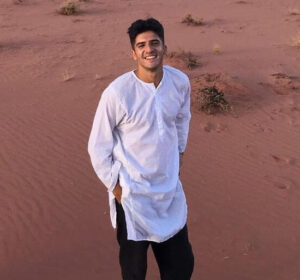
Name: Yusha Sheikh
University/ occupation: Civil Service Fast Streamer
What started your interest in the region? My interest in the region has remained consistent since I was fairly young, but was catalysed during my degree when I studied Arabic and Persian. Particular areas of interest included cross religious dialogue; the dangers of synonymy between religion and governance; how the rise of Islam has affected Western perception of Arab peoples; and Arab-West understanding more generally.
Why did you apply for the fellowship? These themes lend themselves well to a deeper study of Israel/ Palestine and Britain’s historical role within the Conflict. This led me to apply for the fellowship with a view to developing more specific knowledge of the situation through the lens of peace advocacy.
